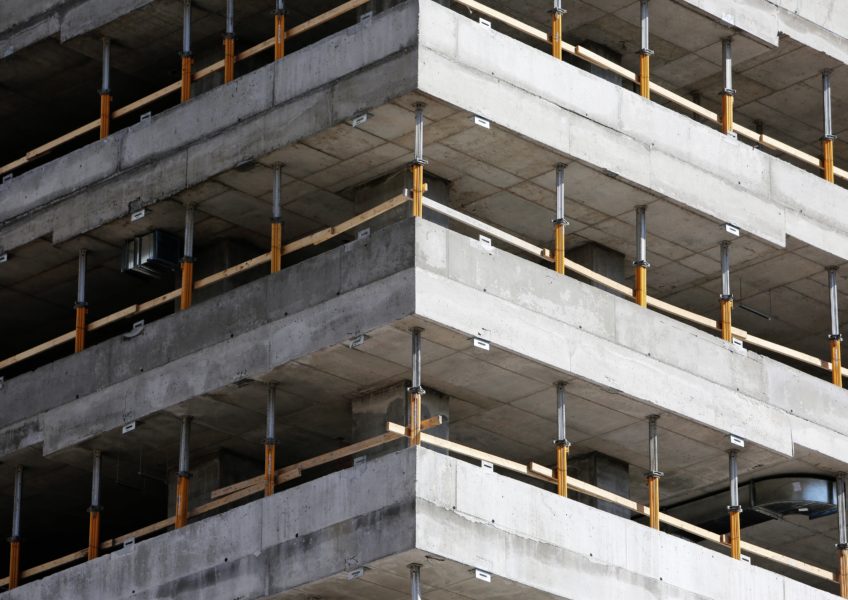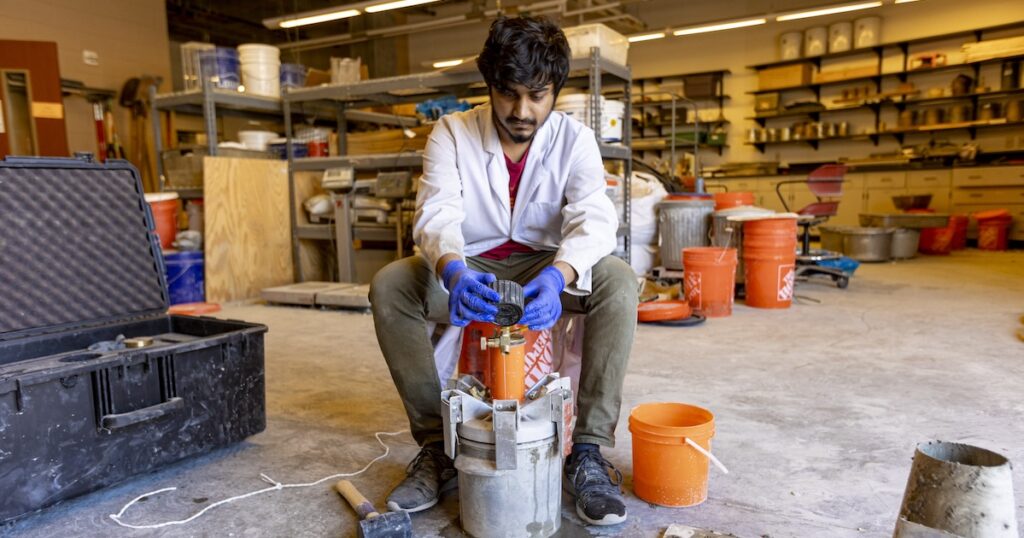The Crucial Function of Concrete Foundation in Structural Integrity and Longevity
When it involves constructing a residential or commercial property, the structure is a lot more crucial than you may think. Concrete foundations offer unparalleled strength and toughness, guaranteeing your structure can withstand various ecological obstacles. Without a strong base, you risk possible problems like changing or cracking, which can jeopardize safety and value. Comprehending the nuances of concrete structures could be the trick to preserving your financial investment for years to come. So, what should you take into consideration following?
Recognizing the Importance of Concrete Foundations
Concrete foundations are essential to the total stability of any type of structure, as they offer the vital assistance required to hold up against various loads and environmental conditions. When you consider building a home or a business space, the structure is the first thing you should consider. It serves as a barrier against moisture, securing your property from water damages. A well-placed concrete foundation likewise prevents settling and changing, which can result in fractures in walls and floors. You'll desire to guarantee that the structure is properly made and reinforced, as this influences the durability of your structure. Additionally, a solid structure can improve energy performance by reducing air leakages. Remember, disregarding the significance of a concrete foundation can result in expensive repair work down the line. Investing in a top quality structure upfront is crucial for the stability and resilience of your framework.
Benefits of Concrete Structures for Structural Stability
While lots of variables contribute to a building's architectural integrity, concrete structures offer unequaled sturdiness and toughness. You'll appreciate that concrete can stand up to severe climate condition, standing up to both wetness and temperature level variations. This resilience indicates your framework is much less most likely to experience breaking or shifting gradually, which can jeopardize its safety.Additionally, concrete's inherent weight gives a solid base, avoiding activity throughout all-natural events like quakes or floodings. When you choose a concrete structure, you're also selecting low upkeep; unlike timber, it won't rot or draw in bugs, conserving you money and time in repairs.Moreover, concrete's fire resistance uses included safety and security, guaranteeing your structure can endure heats without considerable damage. Generally, purchasing a concrete structure indicates you're focusing on the lasting stability and stability of your structure, making it a sensible choice for any type of building and construction project.
Usual Kinds Of Concrete Foundations
When it concerns building foundations, recognizing the common sorts of concrete structures can help you make notified selections for your project. One of the most prevalent kinds consist of slab-on-grade, crawl area, and full basement foundations.A slab-on-grade foundation is an easy, cost-efficient choice, where a thick concrete piece is poured straight on the ground. This kind works well in warm climates, as it lessens heat loss.Crawl area structures raise the home slightly above ground, permitting air flow and accessibility to plumbing and electrical systems. This layout can help protect against moisture issues.Full cellar foundations use added living or storage room while supplying excellent architectural assistance. They require even more excavation and are normally used in chillier environments to protect against frost heave.
Aspects to Consider When Creating a Concrete Foundation

Best Practices for Putting Up Concrete Foundations
When you're setting up a concrete structure, correct website prep work is vital to guarantee security (West Coast General Engineering Concrete). You'll additionally require to understand reinforcement techniques to boost strength and sturdiness. Finally, don't ignore the treating procedure, as it plays a fundamental duty in attaining a solid structure
Website Preparation Significance
It might seem straightforward, correct site preparation is essential for guaranteeing a solid and resilient concrete structure. Beginning by clearing the area of any kind of particles, greenery, or organic product that could compromise the foundation's honesty. Next, evaluate the soil kind and compaction; you might need to dig deep into or include materials to create a stable base. Degree the ground to guarantee also weight circulation and avoid resolving issues later on. Mounting correct drainage systems is additionally important to avoid water build-up, which can compromise the foundation with time. Mark out the foundation's measurements properly to direct the putting procedure. By complying with these actions, you'll establish the stage for an effective concrete structure that stands the test of time.
Support Techniques Described
As soon as the site is appropriately prepared, the next action in assuring a sturdy concrete foundation entails implementing reliable support techniques. You should start by utilizing steel rebar, which offers tensile toughness and helps avoid cracking. Lay the rebar in a grid pattern, making certain it rises utilizing spacers to keep correct protection. Furthermore, take into consideration making use of wire mesh for extra assistance, especially in locations subject to heavy lots. Don't forget to link the rebar junctions securely with cable. For larger foundations, fiber support can enhance longevity, decreasing the threat of shrinkage splits. Constantly adhere to neighborhood building codes and standards to ensure compliance. By using these reinforcement methods, you'll greatly boost your foundation's stamina and long life, laying a solid groundwork for your structure.
Treating Process Fundamentals
To guarantee your concrete foundation remedies appropriately, it is essential to preserve ample moisture and temperature conditions quickly after pouring. Start by covering the surface with a wet cloth or plastic bed linen to retain dampness. This maintains the concrete hydrated, preventing splits and guaranteeing toughness. You should also keep track of the temperature; perfect treating problems are in between 50 ° F and 90 ° F. If it's too hot, mist the surface area regularly to avoid quick dissipation. For winter, take into consideration making use of protecting blankets to maintain heat. Go for a healing duration of a minimum of 7 days, as this is crucial for ideal stamina advancement. By complying with these finest practices, you'll boost your foundation's durability and long life, making sure structural integrity for several years to find.
Maintenance of Concrete Structures for Durability
To keep your concrete structure solid and long-term, routine inspections are vital. You ought to also assure reliable drain solutions are in location to prevent water damages. If you find any kind of cracks, resolving them immediately will save you from larger problems down the line.

Routine Examinations and Assessments
While routine examinations and assessments may appear like a task, they're important for keeping the integrity of your concrete foundation. By regularly looking for splits, shifts, or signs of wear, you can catch prospective concerns prior to they rise right into costly repair work. Look for any water pooling around the foundation or uncommon settling, as these can indicate underlying troubles. It's additionally a good idea to monitor any kind of adjustments in your home's framework, like doors that stick or home windows that don't open efficiently. Maintaining a record of your evaluations aids track modifications in time, permitting for aggressive maintenance. Inevitably, these assessments ensure your structure stays secure, supporting the durability and safety of your entire structure. Do not neglect this essential aspect of homeownership!
Efficient Water Drainage Solutions
Routine examinations roman slate concrete stamps for sale can reveal problems like water drainage problems that may jeopardize your concrete foundation's stability. To stop water buildup, assure your rain gutters and downspouts direct water far from the foundation. Installing French drains can effectively reroute surface and groundwater, minimizing stress on your foundation walls. Furthermore, grading the dirt around your home aids guarantee that water streams away, as opposed to pooling near your foundation.Consider making use of sump pumps in locations prone to flooding, as they proactively get rid of excess water. Routinely examine for obstructions in drain systems and webpage clear them quickly. You'll safeguard your structure's integrity and durability by taking these proactive measures. Keep in mind, reliable water drainage solutions are important for maintaining a strong, resilient concrete foundation.
Prompt Crack Repair Works
When you see fractures in your concrete structure, resolving them immediately is crucial for keeping its long life. Tiny fractures can promptly evolve into larger concerns, endangering the structural stability of your home. On a regular basis evaluate your structure for indicators of damages, such as straight or upright fractures. If you identify any kind of, do not wait-- repair them promptly. You can use epoxy shots or concrete patching substances, which are efficient for securing cracks. Always follow the manufacturer's guidelines and take into consideration getting in touch with an expert for significant damages. Remember, prompt repairs not only improve your structure's sturdiness however likewise save you cash in the future by protecting against extra considerable repair services down the line. Remain positive, and your foundation will stay strong and secure.
Resolving Typical Problems With Concrete Foundations
Concrete structures can encounter different problems gradually, making it critical to identify and resolve them without delay. One of the most typical issues is cracking, which can happen as a result of temperature level changes or settling dirt. If you observe cracks, it's necessary to analyze their size and deepness; little splits can frequently be secured, while larger ones may require specialist evaluation.Water invasion is an additional major issue. Excess dampness can result in mold and mildew development and structural degeneration. Guarantee proper drain around your foundation to alleviate this threat. In addition, search for indications of websites moving or bowing wall surfaces, as this can show underlying problems with your structure's stability.Regular inspections are essential to capture these problems early. If you detect any worrying indicators, do not hesitate to speak with a foundation professional. By remaining aggressive, you can keep the stability and longevity of your concrete structure, ensuring your home remains secure and protected.
Frequently Asked Concerns
Exactly How Does Soil Type Affect Concrete Structure Efficiency?
Soil type substantially affects concrete structure performance. If you have actually obtained extensive clay, for instance, it can trigger shifting and breaking. Sandy soil could lead to settling. Understanding your dirt helps ensure a steady foundation.
Can Concrete Foundations Be Fixed if Harmed?
Yes, you can fix damaged concrete structures. Depending upon the level of the damages, strategies like epoxy injection or slab jacking can restore security. It's finest to consult a professional for reliable remedies.
What Is the Normal Life Expectancy of a Concrete Structure?
A concrete structure commonly lasts 30 to 100 years, depending on factors like soil conditions, environment, and maintenance. You'll intend to keep an eye on it to guarantee it continues to be healthy throughout its lifespan.
Exist Option Materials to Concrete for Foundations?
Yes, there are choices to concrete for foundations, like steel, hardwood, or perhaps recycled products. Each option has one-of-a-kind benefits and drawbacks, so you must consider your project's details requirements when selecting the right product.
Just How Does Climate Influence Concrete Foundation Durability?
Environment significantly influences concrete foundation longevity (West Coast General Engineering industrial concrete). Extreme temperature levels, dampness, and freeze-thaw cycles can weaken the material, leading to splits and structural problems. You should consider neighborhood climate problems when planning your foundation to guarantee lasting performance